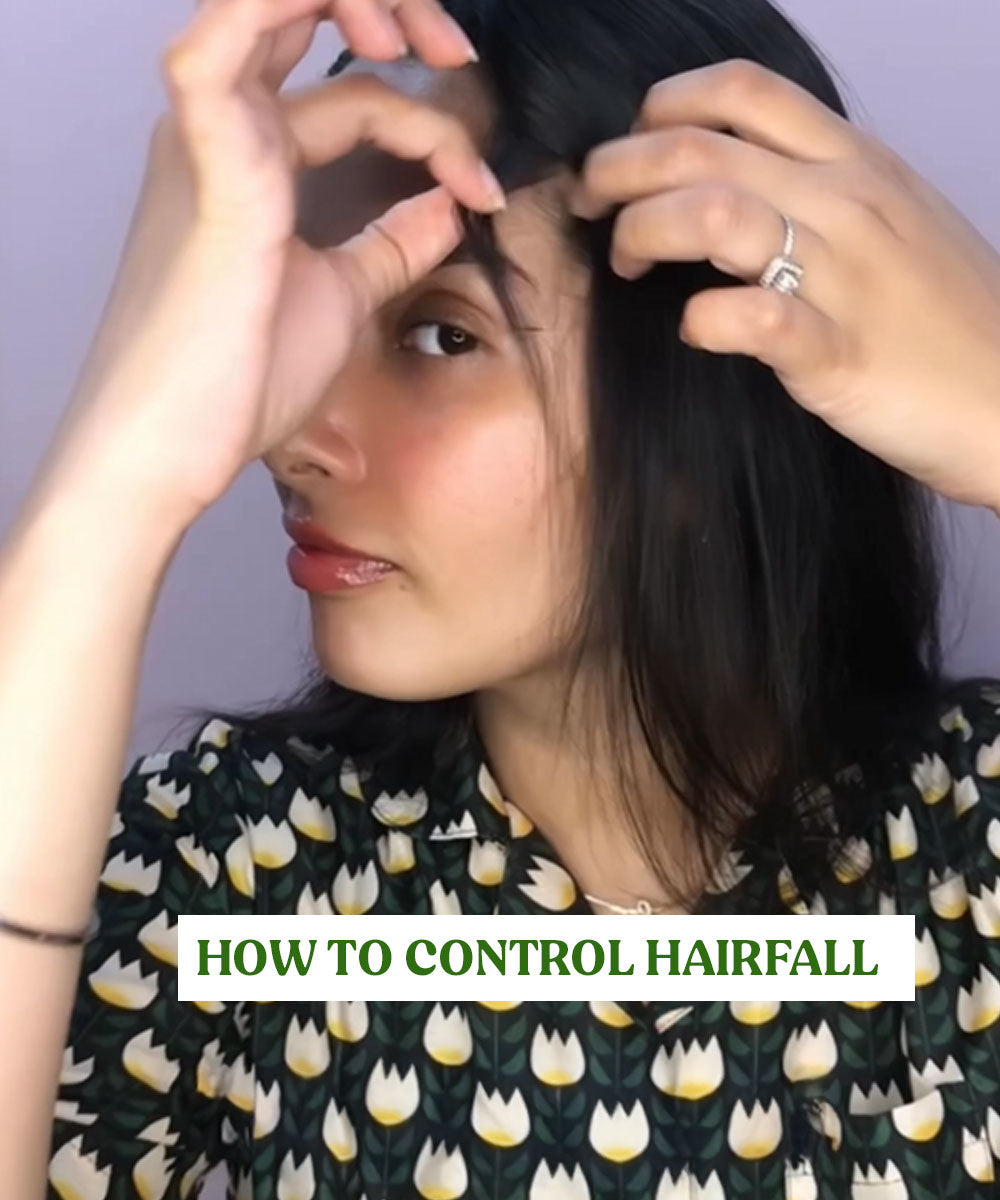We’ve all been there standing in front of the mirror, staring at the clump of hair in our hands or on our pillow, wondering “Why is this happening to me?” A few strands are normal, but when your drain looks like it is growing its own wig, it can feel scary and frustrating.
Hair fall isn’t just about looks, it can shake your confidence and make you feel stressed, which ironically causes even more hair fall. The good news? Most of the time, there are clear reasons behind it and practical ways to reduce it before things get worse.
In this guide, we will uncover why hair fall happens, the common mistakes that make it worse, and simple, science-backed steps you can take to prevent and control it naturally and effectively. Because you deserve to see your hair thrive, not just survive.
Causes of Hair Fall: Why Hair Fall Happens
Hair fall doesn’t happen overnight. It’s your body’s way of signaling that something isn’t right. Losing 50 to 100 strands a day is normal, but when you notice extra hair on your pillow, in your shower drain, or tangled in your comb, it is time to pay attention.
Here are some real reasons why your hair might be falling out:
- Stress overload: Mental pressure, work deadlines, or emotional stress can mess with your hormones and weaken hair roots.
- Poor diet: When your body doesn’t get enough iron, protein, or vitamins, your hair is the first to show signs of trouble.
- Hormonal changes: Conditions like thyroid imbalance, PCOS, or post-pregnancy shifts can lead to sudden hair loss.
- Wrong hair products: Harsh shampoos or chemical treatments can strip your scalp and damage hair follicles.
- Sleep issues: Lack of deep, restful sleep slows down your body’s repair process, including healthy hair growth.
- Medical reasons: Certain medicines or untreated health conditions can trigger heavy shedding.
Hair fall is usually a symptom, not the problem itself. Understanding the root cause is the first step toward healthier, fuller hair.
How to Prevent Hair Fall Naturally
Hair fall can feel like a nightmare, but the truth is your hair is stronger than you think. With the right care and habits, you can slow down shedding and bring back that healthy, happy hair you love. No harsh chemicals, no expensive treatments, just simple, natural steps that really work.
Here’s how you can prevent hair fall naturally:
- Eat for your hair: Add iron-rich foods like spinach, lentils, and eggs, along with nuts and seeds for protein and healthy fats.
- Massage your scalp: A warm oil massage boosts blood flow to your roots and strengthens follicles.
- Switch to gentle products: Choose mild, natural shampoos and conditioners that don’t strip away your hair’s natural oils.
- Stay stress-free: Yoga, meditation, or even a 10-minute walk can help lower stress and prevent sudden hair loss.
- Protect your hair: Avoid tight hairstyles, excessive heat styling, and harsh treatments.
- Hydrate inside and out: Drink enough water and keep your scalp moisturized to reduce breakage.
Small, consistent changes today can save you from big hair fall worries tomorrow.
How to Reduce Hair Fall
Watching strands of hair collect on your pillow or clog your shower drain can be heartbreaking. But here is the good news, hair fall control is possible with the right care and consistency. You don’t need to completely change your life overnight; you just need to focus on small habits that protect your hair every day.
Here’s how to reduce hair fall and give your scalp the love it needs:
- Start with a healthy scalp: A clean, nourished scalp is the foundation for strong hair. Use a gentle, natural shampoo that supports hair fall control without harsh chemicals.
- Oil before you wash: Regularly massaging with a nutrient-rich hair oil strengthens roots and improves blood circulation.
- Handle your hair gently: Avoid rubbing your hair with a towel or brushing when wet, this is when it’s most fragile.
- Choose the right products: If you’re wondering how to control hair fall, switch to products made for this concern, like a hair fall control shampoo and strengthening hair oils.
- Trim regularly: Split ends can travel up the hair shaft, causing more breakage.
- Stay stress-free: Emotional stress can directly trigger hair loss, so practice calming activities like meditation or deep breathing.
Remember, consistency is key. Reducing hair fall isn’t about quick fixes; it is about building a routine that protects your strands and helps them grow stronger day by day.
Effective Hair Fall Control
Dealing with hair fall can feel like a never-ending battle, but with the right products and routine, you can finally see a real difference. The key is to nourish your scalp, strengthen your roots, and protect your hair from further damage, all while using solutions that actually work.
Here’s how you can take control of your hair health:
- Cleanse gently, strengthen deeply: Switch to a Herbal Shampoo that is free from harsh chemicals. It helps remove dirt and buildup while keeping your scalp balanced and healthy.
- Treat with targeted care: A Hairfall Control Combo is perfect if you are looking for a complete solution. It combines shampoo and hair oil to reduce hair fall and promote stronger, fuller hair.
- Boost hair strength naturally: If your hair feels weak and brittle, try a Hair Strengthening Combo. It is designed to nourish roots and prevent breakage, making your hair resilient over time.
- Tackle dandruff-related hair fall: Flakes and irritation can weaken your scalp and cause excess shedding. Using an Anti-Dandruff Hair Oil not only fights dandruff but also keeps your scalp moisturized and healthy.
When you pair these products with healthy habits and a consistent routine, hair fall doesn’t stand a chance. With the right care, you can move from constant worry to confident, happy hair days.
Frequently Asked Questions
1. Can dandruff cause hair fall?
Yes. Dandruff causes itching, and frequent scratching weakens hair roots, leading to hair fall. Treating dandruff early with a gentle anti-dandruff oil and shampoo helps prevent this.
2. How much hair fall is normal?
Losing 50–100 strands a day is normal. Anything more, especially visible clumps of hair, could signal excessive hair fall and needs attention.
3. What are the stages of hair fall?
Hair fall usually progresses through three key stages:
- Initial Stage: Mild hair shedding that many people ignore.
- Moderate Stage: Noticeable thinning and weaker hair roots.
- Advanced Stage: Visible bald spots and slow regrowth.
Treating hair fall early in the first stage gives the best chance for complete recovery.
4. What are the best tips for hair fall control?
Massage your scalp with natural oils, use a gentle shampoo, and eat nutrient-rich foods. Manage stress and get enough sleep, a healthy body and calm mind support strong, healthy hair.
5. Does sweating cause hair fall?
Yes, too much sweat can mix with dirt and oil, clogging scalp pores and weakening roots. Keep your scalp clean and wash hair regularly to prevent dandruff and hair fall.


 Track Order
Track Order












Leave a comment
All comments are moderated before being published.
This site is protected by hCaptcha and the hCaptcha Privacy Policy and Terms of Service apply.